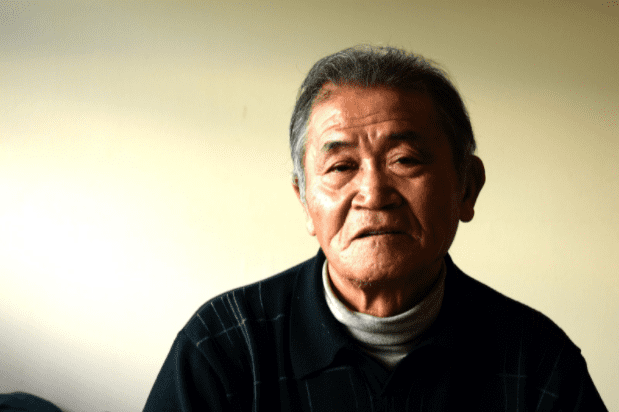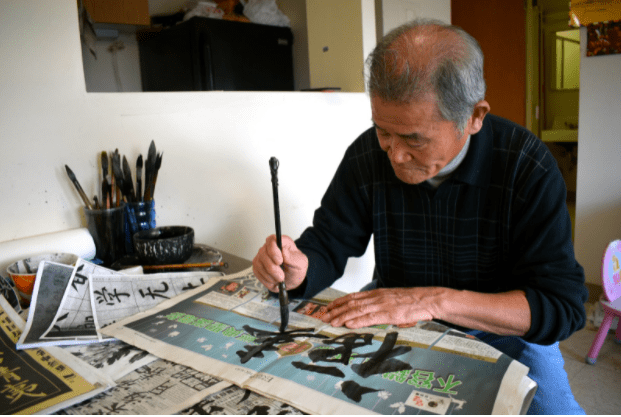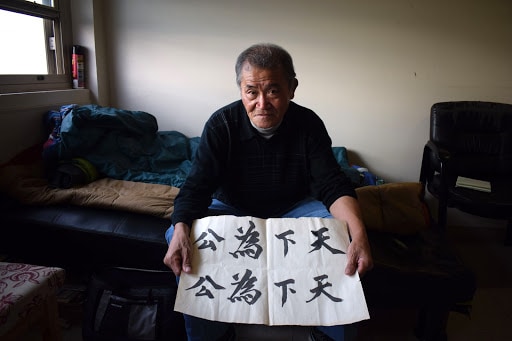Every day World Relief staff and volunteers are invited into stories. We are challenged to recognize the nuanced image of God in each person we serve, and remember that their stories stretch far beyond the boundaries of words like “immigrant, refugee, asylum-seeker.” The posts in this section—voiced in first-person, too long for social media, and lightly edited—extend that invitation to you.
In this post we meet Gao Guanghua. When he arrived in the U.S. after spending years as a refugee in Thailand, you were there to walk alongside him. As a community of volunteers and donors, you helped Gao find a doctor who speaks his language, gain access to subsidized senior housing, and connect with Chinese-American friends.
Journey
My journey to America is a long story, but I can make it brief. In China, I was a doctor. I was a soldier. I was a teacher. In 1989, June 4, the Tiananmen Square event happened, as we all know. I went from my home to Tiananmen Square to participate. After that, I was affected in a negative way because of my participation. So eventually, I went to Thailand and I stayed there seven or eight years.
I had been a doctor in Chinese medicine for ten years. So, in Thailand I could make my personal information public and open my own clinic. I also worked at a hospital and split the profits with my supervisor. But now in the U.S., not only can I not open a clinic. I cannot even be a doctor. If I want to be a doctor, I must have my certificate mailed here from China. Then I have to take some tests and turn it into an American certificate in order to be a doctor legally here. In that sense, I had more freedom in Thailand than I have here. It’s like a hero who has no place to show off (laughs).
Anyway, UNHCR had an office in Bangkok. I spent a lot of money applying to become a refugee. It took a lot of time and it was complicated. Eventually, they approved me as an international refugee. It was a different kind of refugee than the way we talk about it in my culture. It doesn’t mean you have to be homeless. It’s more about people being politically persecuted. Most of the refugees from China are refugees because they are persecuted by the Chinese government. I belong to that group. So I was approved as a refuge, and after that UNHCR took care of me very carefully and sent me to the U.S. I came here, and got some benefits from the U.S. government.
My caseworker found a college student — also from China — who picked me up at the airport. All my I.D. and documents are now at World Relief. I didn’t have to get a lawyer or spend any money. WR just actively provided me with those things. This is a brief summary of how I came to the U.S.

A Story from My Childhood
I have so many stories from my life, I don’t know where to start. Here’s a positive story from when I was in middle school – around 15 years old. There were six middle schools around several kilometers from my home to the north, and that’s where I went to school. I had to go across a river to get to school. It was around 5-6 meters wide. In winter we could just walk on the ice. In summer, usually the water was not that strong. It only came up to our chests, and we could just walk across. But in the rainy season – July and August – it’s stormy. Then, people will sink into the water if they cannot swim.
During one rainy season, there were 8 or 10 times when the flowing of the water was harsh. Me and five other boys needed to cross the river. There was no boat, and I was the only one who knew how to swim. So I brought them across the river one-by-one.
We all brought lunches to school. We called it dry food. Life wasn’t easy, so we ate these wild vegetables and a kind of wild wheat. We made it into a kind of steamed bun. So everybody carried many of these buns. I took my friends across the river. They had to take off their clothes becuase if they wore them into the water, it was hard for me to take them swimming. After I got them all across, I came back to get all the food too. I was so tired. The boys gave me applause.
When I got to school, my teacher praised me too. And the president also honored me in front of all the students. They even put me into the school newspaper. I was so proud of myself because of this. This was in the 1960’s. I didn’t have a cell phone to take a picture of that newspaper article so I could remember it. We didn’t even have bicycles. We just walked to school.

Teaching School and Calligraphy
When I was a student, it was before Chairman Mao’s cultural revolution. Later, I became a middle school teacher after the cultural revolution. Before the cultural revolution, most teachers were not officially hired. But I was officially hired in a public school.
I taught in schools in remote areas of the countryside. Physics, chemistry, math, geography, biology, and some other courses like writing, music, physical education, and arts. Calligraphy was not an important part of what we taught.
If you went to school before the cultural revolution, you’d learn calligraphy. If you went after, you wouldn’t learn calligraphy. It disappeared. So right now, very few people in China can write like this.
Calligraphy is a treasure of Chinese culture. I was seven or eight years old when I started learning calligraphy. I didn’t like it at the beginning. But the more I practiced, the more I developed an interest. Especially in my home town in the northern part of China, people in my father’s generation could do excellent calligraphy. Each year for the Chinese new year, every home had a person who could create a banner for each side of the door. The banners had phrases or blessings with the same general idea – well wishes for people in their careers, wishes that they’d be prosperous, peaceful, and healthy. But there are a variety of ways to say it.
Now, I’m part of Chinese calligraphy organization here in Chicago. We do a lesson once a week. We’ll give you one brush and some ink for free. It used to be $10 per lesson, but now it’s only $5. Still, very few people come to learn. There’s another organization that does lessons for free, so there are more people there. Most of them are elderly Chinese. Also, every Tuesday, I go to a senior center in little Vietnam and teach Chinese calligraphy.

Explaining a Chinese Proverb
This one is a saying from Confucius, quoted by another very famous leader. In Chinese, each character represents an idea. So, this first one on the right means the heavens. The second one means everything under heaven – many people, many nations, but they’re all human beings. The third one has many different meanings. But in this context it means to do something in order to reach a goal. The last one represents the public. Look at the image of this last character. One stroke to the left, one stroke to the right. Below those two strokes is a symbol that means, “self.” It basically means, eight people can make a group or fellowship.
So the combined meaning of the whole phrase is: Everything under the heaven and down to the earth is done for the public. For ordinary people. It’s not determined by only one person or politician.
We can use this to describe America’s political system. But China is far away from that kind of system. And that’s the best I can explain it. The Chinese language is very deep. Very complicated. For example, maybe you can learn English in three years, but you cannot acquire Chinese in thirty years.
Like his language, Gao Guanghua’s story is deep and rich. Together, we’ve helped restore a tiny bit of the pride and connection he felt back when he had his own medical practice, or the day he swam his classmates across the river. You can help more people like Gao rebuild their lives in the U.S.

